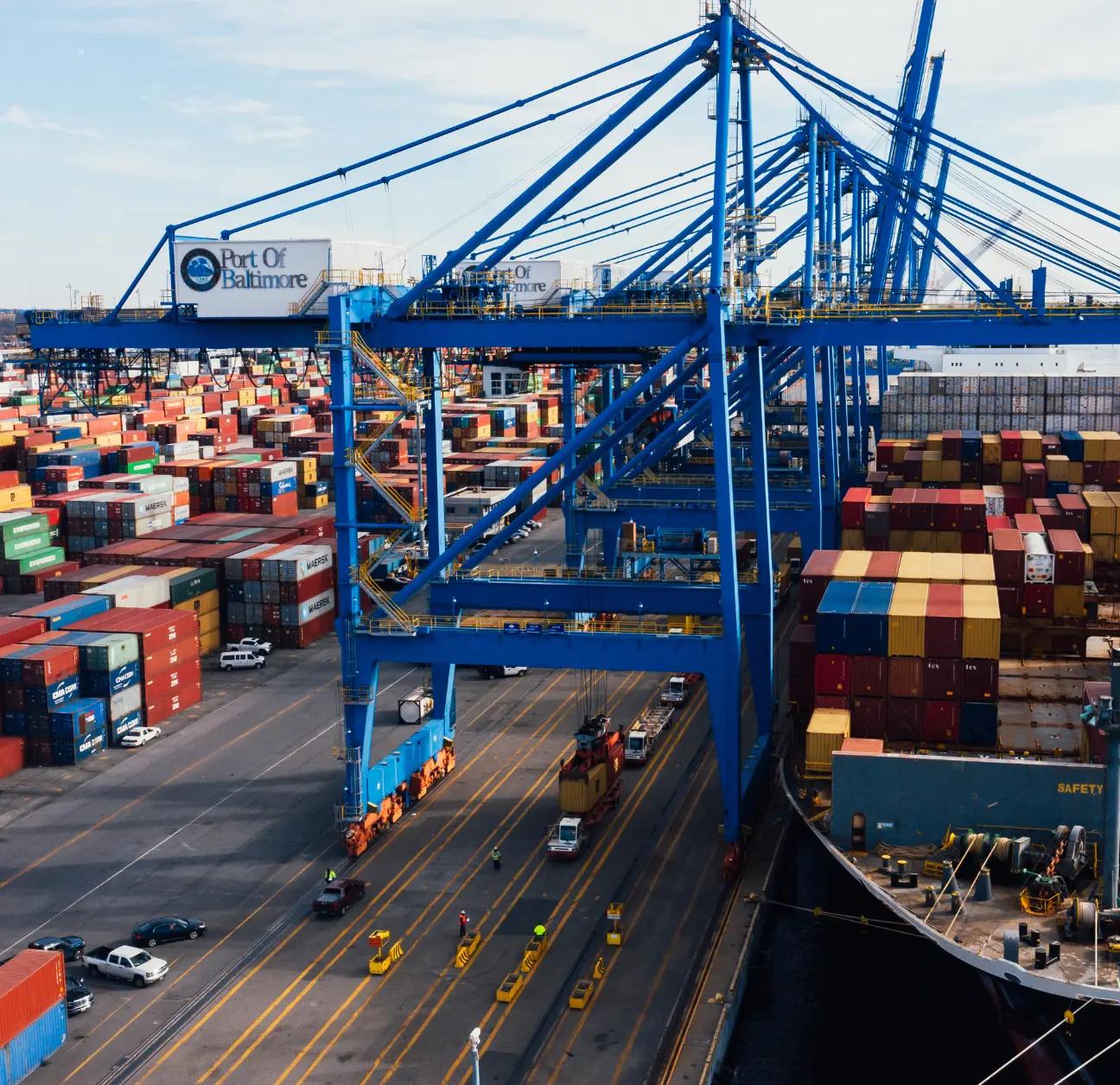Supply chain management and transportation management systems run the gamut from1980s-era systems to modern cloud platforms. Chain.io was built to integrate your TMS to any platform, regardless of the era it was built in, with ease.
Supply Chain Integration Platform
Supply chain integration streamlines all communication between buyers, sellers, and other stakeholders through the planning, execution, transportation, and logistics processes involved in product production and order fulfillment. Supply chains are a network of suppliers, companies, and customers. The supply chain network comprises organizations, resources, people, and actions that facilitate the production of and delivery of goods from the supplier to the production companies and then finally deliver finished products to the final consumer.
Clear communication among every part of the supply chain is necessary but can be challenging with so many moving parts and people. A supply chain integration platform helps streamline communication between all internal stakeholders, trading partners, and others in the supply chain process. Communicating using emails, messaging, phone calls, or other forms of communication may seem feasible. In reality, with so many people and companies involved with a supply chain, communication is easily missed and becomes confusing when attempted across multiple communication channels. In addition, transparency in the supply chain process is critical. Effective supply chain integration improves transparency and access to real-time data in supply chain management for everyone involved in the supply chain process.
The challenge is how to integrate communication, increase transparency, and provide real-time visiblity for every point in the supply chain. A solution to this challenge is an effective supply chain integration platform.
What is a supply chain integration platform?
A supply chain integration platform combines all the data and processes used in a supply chain to provide a centralized, real-time view of the entire process. Supply chain integration involves integration, operations, purchasing, and distribution. An integration platform as a service, or iPaaS, is a set of cloud-based tools capable of integrating software applications across different environments. iPaaS integrates data, applications, and processes supporting cloud-to-cloud, hybrid, and B2B integration. In addition, an iPaaS platform modernizes supply chain integration, taking it from limited on-site systems to streamlined cloud-based technology more compatible as a global supply chain network.
Supply chain integration is capable of sending real-time data between supplier and buyer. iPaaS is a fast, cost-effective way for companies of any size to rapidly improve business processes by integrating systems and applications and then automating processes and data management. Moving to cloud-based systems facilitates rapid deployment. In addition, it offers greater flexibility while increasing efficiency and productivity. An iPaaS system can improve scalability and reduces the need for some resources resulting in reduced operational costs and an increased ROI.
Why is an iPaaS platform necessary for integration when most supply chain management uses computer systems? Moving to a cloud-based platform simplifies integration and automation because companies using iPaaS platforms no longer need to store and maintain on-site systems or invest in development and coding. Subscribing to integration as a service enables a company to immediately start integrating applications, loading data, and automating business processes, saving them time, money, and resources. iPaaS offers a range of pre-built integration tools along with low-code API connectors allowing for rapid connection of apps and business systems. In addition, quick integration with an iPaaS platform offers many benefits for supply chain management.
Integration Platform as a Service
An integration platform as a service is a system used to organize, implement and connect new business applications. iPaaS tools help companies seamlessly share data and integrate existing processes into the cloud. Cloud-based integration has many benefits, such as no longer needing to overhaul an entire system every time a new application is required. Integrating systems and applications is simplified with iPaaS solutions. An iPaaS system is also a data integration platform providing a single, consistent process for an entire organization, all applications, and data. The benefits of using a cloud-based API integration platform are paramount for data integration. APIs enable software components to communicate using definitions and protocols. With a cloud-based iPaaS platform, all data is governed consistently, recorded, stored, and presented in an easily adaptable way compatible with existing applications and with the introduction of new applications. Simplifying and streamlining these processes increases efficiency and productivity in addition to optimizing communication among the many integral people involved in a supply chain.
An effective integration platform is essential for supply chain management today. iPaaS can help mitigate disconnected supply chains and optimize data centers. Supply chains require technology investments to accomplish mission-critical logistics worldwide, including cloud-based data integration. When cloud-based technology started becoming more mainstream in the B2B sector, Gartner recognized that many businesses at the time didn’t think mission-critical systems, like supply chains, were appropriate for the cloud. Many companies have since experienced a mindset change and many are moving all operations to cloud-based systems.
Regarding iPaaS, Gartner defines the service as a combination of integration technologies delivered as a suite of cloud-based services. iPaaS tools set up and configure cloud-based servers. It is a solution for hosting, developing, and integrating data. The work performed by iPaaS solutions improves a company’s operations by streamlining data flow between multiple systems. It gives a business the flexibility to integrate cloud and on-premise applications, sync all the data, and share it in real time. Optimizing the sharing of data between multiple systems is critical for supply chain management. Integrated technology empowers supply chains with effective mission-critical logistics, allowing for high levels of service and communications and minimizing the potential for significant failures. In addition, comprehensive data and real-time visibility enhances inventory tracking, reduces capital expenditures, and improves accurate replenishment efforts.
iPaaS Examples
Integration platform as a service refers to a suite of cloud-based tools that enable the deployment, management, and integration of software applications and services across various platforms. Enterprise integration platform as a service allows organizations to easily integrate on-premise applications and switch to cloud-based applications through iPaaS architecture. Integration platform as a service examples show how an iPaaS cloud framework enables communication across diverse systems while facilitating data sharing and integration, enhancing collaborative work relationships through accountability and transparency.
Examples of integrations performed by an iPaaS provider, like Chain.io, include connecting freight visibility data or Carbon impact data to a freight forwarder's transportation management system through a TMS integration or Cargowise integration. Other integrations can include connections to customs software to streamline the movement of international freight, or connections to rate management platforms that make booking freight for transport faster and more transparent.
Supply Chain Integration Benefits
Adopting the latest supply chain technology gives companies a significant competitive advantage. Cloud computing is the future of supply chain integration in three major areas:
- Clear, consistent supply chain objectives
- Effective, collaborative strategic sourcing
- Scalable supply chain processes
Supply chain management has many challenges, such as limited IT integration among suppliers and limited data sharing or collaboration. In addition, inconsistent processes and complex supply chain networks make streamlining operations difficult. Optimizing integration for supply chains is critical for driving down the cost of quality service, accelerating time-to-market, and expediting improvements.
Supply chain integration is an essential factor for obtaining superior supply chain performance. For example, successful integration improves transparency, which is essential for both supply chain management and customers. Integration with real-time data sharing builds trust between suppliers, companies, and customers. Genuine supply chain transparency depends on factually based information available throughout every stage of the supply chain process. It is vital to note that supply chain integration maximizes transparency, offering supply chain enterprises an opportunity to increase revenue by building trust and reliability.
There are many benefits of supply chain integration using an iPaaS for both supply chain enterprises and suppliers. The best supply chain integration platform will improve reusability, productivity, and overall user experience. In addition, successful integration will increase collaboration between suppliers and buyers. Other iPaaS benefits include more efficient customer onboarding, long-term sustainability, reduced process loss, and increased revenue. Also, supply chain integration can deliver significant profit margins, decrease wastefulness, and increase efficiency.
Supply chain-specific integrations apply to information and communication systems for all stakeholders allowing a seamless exchange of information through every step of the supply chain process. Chain.io offers supply chain integration benefits as supply chain specific integration platform. We've baked supply chain best practices into our software and are pre-connected to the world's leading supply chain systems.
With decades of supply chain experience, the Chain.io team provides an integration platform with adapters to simplify the connecting process for two or more software systems. Chain.io is well-known for expediting projects, with rapid completion of integrations allowing customers to free up resources and focus on innovation and service without overloading their internal IT teams in a matter of weeks rather than months or years.
Compatible with any system from the newest APIs to 1980s-era flat files, Chain.io is available to support the supply chain businesses process that matters most, such as bookings, visibility into freight and shipments, rate management, invoicing, and more. Chain.io's integration platform software bridges the gap between different eras of technology with ease.
For freight forwarders and other logistics providers, Chain.io empowers you to rapidly integrate with customer and partner systems and immediately establish trust. Chain.io also enables LSPs to scale their businesses quickly and resiliently.
Using Chain.io, shippers can ensure the partners they trust with their freight can provide the right service, visibility, and accountability when handling their precious cargo. Quickly connect with new forwarders and software systems, and keep your TMS outfitted with the latest tools.
Software companies utilize Chain.io to connect their tools to any customers’ existing systems — whether their existing tech is cutting edge or obsolete. Get to “yes” faster by syncing your tech to the platforms and offering an agnostic connection.







